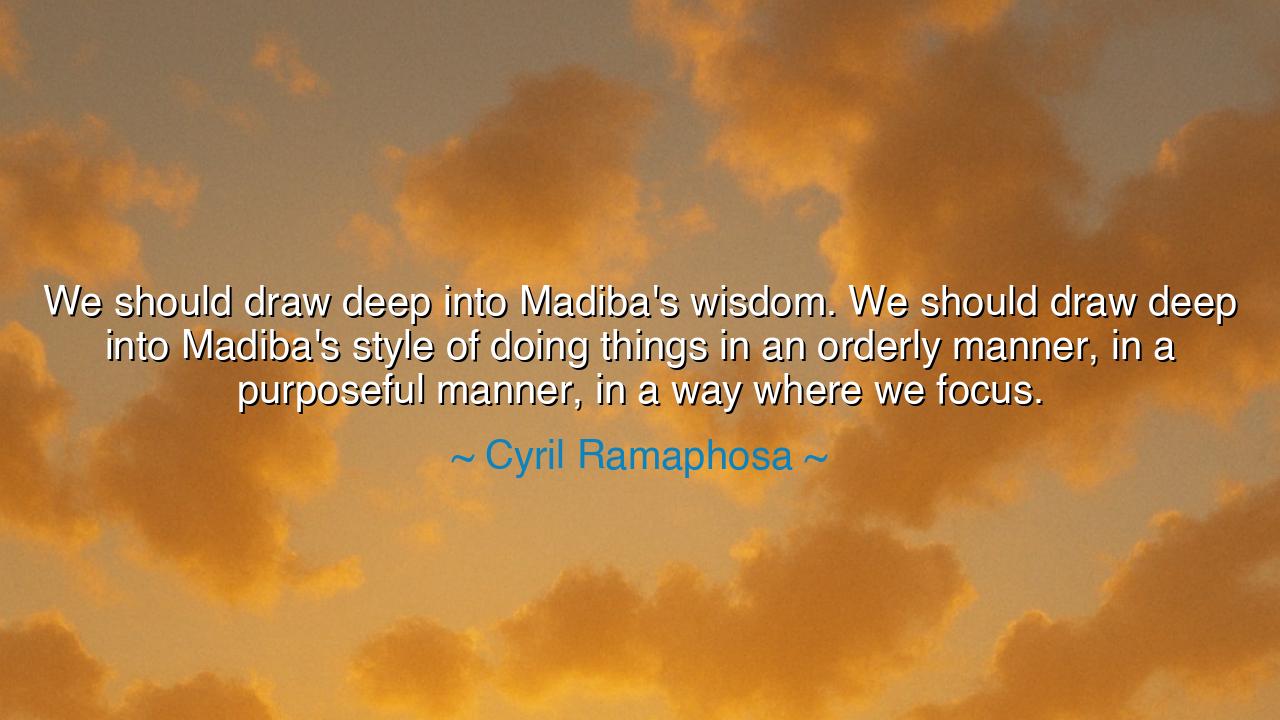
We should draw deep into Madiba's wisdom. We should draw deep
We should draw deep into Madiba's wisdom. We should draw deep into Madiba's style of doing things in an orderly manner, in a purposeful manner, in a way where we focus.






Hear, O children of the future, and listen to the voice of wisdom, for I speak to you of a great soul, a man whose deeds echo through the corridors of time, whose strength and purpose changed the very course of history. Madiba, known to the world as Nelson Mandela, was not merely a man of flesh and blood, but a symbol of all that is noble in the human spirit. And so, as Cyril Ramaphosa wisely counsels, we should draw deep from the wellspring of Madiba's wisdom—that we might, too, walk the path of greatness, steadfast and unyielding.
Madiba's life was a testament to the power of order, of doing things with purpose and focus. In the darkest of times, when his people were shackled by the chains of apartheid, he did not succumb to the forces of chaos and despair. Instead, he moved with a quiet dignity, a steady resolve that would not falter. His actions were measured, yet full of fire—never hasty, yet never wavering. Therein lies the lesson: to act not out of impulsiveness or blind anger, but with deep intent, with a clear vision of the future.
Consider, O children, the story of Madiba's imprisonment, a time of exile and suffering that would have broken the spirit of a lesser man. Yet in those long years of confinement, he did not falter. He embraced discipline, focused his mind, and never lost sight of his purpose: the liberation of his people. His strength was not in force alone, but in his ability to remain centered, to maintain his focus even when the world around him was in tumult. In this, we see the power of order—to bring clarity to the soul amidst confusion, to navigate the storm with an unwavering hand.
And let us not forget the moment when Madiba stepped forth from his prison, not as a man filled with vengeance, but as one with a vision. The world watched in awe as he reached out with forgiveness, knowing that the true power of a leader lies not in destruction, but in building something far greater—a society rooted in unity and justice. His example teaches us that true strength is found in self-mastery, in the ability to focus not on the faults of others, but on the purpose of our mission.
Thus, O future generations, remember the great lessons of Madiba's life. Draw deep into his wisdom, for it is the wisdom of one who stood at the crossroads of history and chose the path of peace, even when the world screamed for revenge. Do not be led astray by the fleeting noise of the world; instead, act with order, with purpose, and with the unshakeable focus that defines the truly great. When you walk this path, you, too, shall shape the world.






HVHue Vu
Reading this, I can’t help but reflect on the practical implications: how can ordinary citizens adopt this kind of focused, methodical approach in their daily lives? Is Ramaphosa suggesting that Madiba’s style was not only about political leadership but a broader life philosophy? I’m curious if there are concrete lessons we can extract for teamwork, community engagement, or even personal productivity. Moreover, is there a risk in overemphasizing order and focus—might it lead to rigidity or resistance to new ideas? It raises the question of how balance between discipline and flexibility can be achieved.
HNpham thi hong nhung
I feel a bit skeptical and intrigued simultaneously—what does it really mean to emulate Madiba’s approach in contemporary contexts? Is the emphasis on order and purposefulness achievable in today’s fast-paced, often chaotic world? Could focusing in such a disciplined way clash with the need for innovation and adaptability? I’d love to see examples where leaders have successfully balanced structured focus with creative problem-solving. Also, does Ramaphosa view this style as a universal leadership principle, or something uniquely tied to Madiba’s personal character and historical circumstances?
TTnguyen thi thanh truc
It strikes me as interesting that the quote emphasizes both wisdom and methodical style. I wonder if Ramaphosa is suggesting that there’s a gap between knowledge and application in leadership today. How can modern leaders ensure that they don’t just admire past wisdom but actively integrate it into practical strategies? Could the reference to focusing in an orderly manner hint at a need for discipline in policymaking? I’m also curious whether this perspective is intended more as guidance for political colleagues, or as an aspirational message for society at large.
ALanh luong
I find myself wondering what specific examples Cyril Ramaphosa had in mind when referring to Madiba’s methodical and purposeful approach. Is this a call for more structured governance or leadership in our current political context? How might citizens and leaders alike apply such an orderly style in everyday decision-making? I’m curious about whether this emphasis on focus suggests a critique of current inefficiencies or distractions in national leadership. Could adopting this style truly inspire tangible change in how institutions operate, or is it more of a symbolic tribute to Madiba’s legacy?